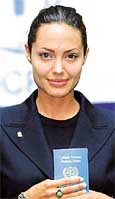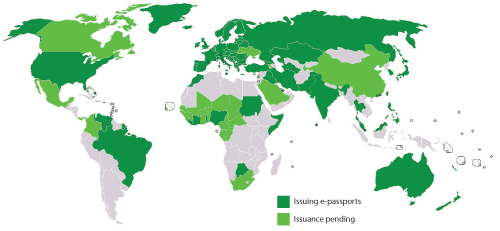It looks like you're using an Ad Blocker.
Please white-list or disable AboveTopSecret.com in your ad-blocking tool.
Thank you.
Some features of ATS will be disabled while you continue to use an ad-blocker.
2
share:
I was at work and stumbled across someones U.N passport, It had me thinking, why was it so necessary to issue a new passport and would the holder take
up 'United Nations' citizenship?
Diplomatic passports are a special form of document that is issued to foreign service officials who are engaging in work-related travel. They have special requirements and privileges that are not attached to the standard passport, or even the service passports that can be issued to government employees engaged in work-related travel. The diplomatic passport is specifically for diplomats and consular officials.
We all know diplomats are rarely harassed at airports and have a very easy time getting VISA's, not having baggage searched etc. In some countries diplomatic police have to be called in to arrest, restore order or even question United Nations personnel as normal police officers are not authorized to do so. Most U.N workers are also Tax exempt.

Source

Why do we tolerate such nonsense from an organization that claims to create equality? Why does such an organization exist in the first place?
Diplomatic passports are a special form of document that is issued to foreign service officials who are engaging in work-related travel. They have special requirements and privileges that are not attached to the standard passport, or even the service passports that can be issued to government employees engaged in work-related travel. The diplomatic passport is specifically for diplomats and consular officials.
We all know diplomats are rarely harassed at airports and have a very easy time getting VISA's, not having baggage searched etc. In some countries diplomatic police have to be called in to arrest, restore order or even question United Nations personnel as normal police officers are not authorized to do so. Most U.N workers are also Tax exempt.

The United Nations (UN) is the primary formal organization coordinating activities between states on a global scale and the only inter-governmental organization with a truly universal membership (193 governments).
In addition to the main organs and various humanitarian programs and commissions of the UN itself, there are about 20 functional organizations affiliated with the UN's Economic and Social Council (ECOSOC), such as the World Health Organization, the International Labour Organization, and International Telecommunications Union.[24] Of particular interest politically are the World Bank, the International Monetary Fund and the World Trade Organization.
The World Bank and the International Monetary Fund (IMF), were formed together at the Mount Washington Hotel in Bretton Woods, New Hampshire, United States in July 1944, to foster global monetary cooperation and to fight poverty by financially assisting states in need.
The World Trade Organization (WTO) sets the rules of international trade. It already has a semi-legislative body (The General Council, reaching decisions by consensus), and a judicial body (The Dispute Settlement Body). Another influential economical international organization is the Organisation for Economic Co-operation and Development (OECD), with membership of 30 democratic members.
G8, an association of the eight highest GDP Nations of the World. The leaders of the G8 countries meet annually in person to coordinate their policies in confronting global issues, such as poverty, terrorism, infectious diseases, and climate change.
G20, an association of twenty developing and established nations and entities, including the European Union. Militarily, the UN deploys peacekeeping forces, usually to build and maintain post-conflict peace and stability. When a more aggressive international military action is undertaken, either ad-hoc coalitions (e.g., multinational force in Iraq), or regional military alliances (e.g., NATO) are used.
International law encompasses international treaties, customs, and globally acceptable legal principles. With the exceptions of cases brought before the ICC and ICJ (see below), the laws are interpreted by national courts. Many violations of treaty or customary law obligations are overlooked.
The International Court of Justice (ICJ) (also known as World Court) is the judiciary organ of the United Nations. It settles disputes submitted to it voluntarily by states (only), and gives advisory opinions on legal questions submitted to it by other organs of the UN, such as the General Assembly or Security Council.
Source
Nearly half of all United Nations (U.N.) member states are now issuing biometric e-passports, according to the newest data from the International Civil Aviation Organization (ICAO), the U.N. agency that oversees international air travel. ICAO, which held its 20th TAG/MRTD meeting in September, reports that 93 out of 193 U.N. member states now issue e-passports, with 21 additional countries ready to deploy the technology in the next 12 to 48 months.

Why do we tolerate such nonsense from an organization that claims to create equality? Why does such an organization exist in the first place?
edit on 23-6-2012 by DeadSnow because: (no reason given)
i know this is really prettybad, but all i have took from this post is a massive urge to try and get a job with the UN.
i know it sounds silly, i would love one of them UN passports though ... they sound total elite !
i know it sounds silly, i would love one of them UN passports though ... they sound total elite !
reply to post by boaby_phet
Go for it then, it's pretty easy but be prepared to live in a real s***ty place. You may also have to do an internship first for a few months to a year.
Go for it then, it's pretty easy but be prepared to live in a real s***ty place. You may also have to do an internship first for a few months to a year.
it would be worth it to really find out how the world works at the upper levels of power
i
i
reply to post by boaby_phet
It would be a waste of life to attempt to penetrate the upper levels of society via the U.N (Unless you want to work there for 40 years+). As I write this, Koffi Anans struggle still continues, oh well he'll finally find the first piece to his puzzle in another 20 years
It would be a waste of life to attempt to penetrate the upper levels of society via the U.N (Unless you want to work there for 40 years+). As I write this, Koffi Anans struggle still continues, oh well he'll finally find the first piece to his puzzle in another 20 years
new topics
-
Only two Navy destroyers currently operational as fleet size hits record low
Military Projects: 5 hours ago -
George Stephanopoulos and ABC agree to pay $15 million to settle Trump defamation suit
Mainstream News: 11 hours ago
top topics
-
George Stephanopoulos and ABC agree to pay $15 million to settle Trump defamation suit
Mainstream News: 11 hours ago, 17 flags -
More Bad News for Labour and Rachel Reeves Stole Christmas from Working Families
Regional Politics: 17 hours ago, 8 flags -
Only two Navy destroyers currently operational as fleet size hits record low
Military Projects: 5 hours ago, 7 flags
2
